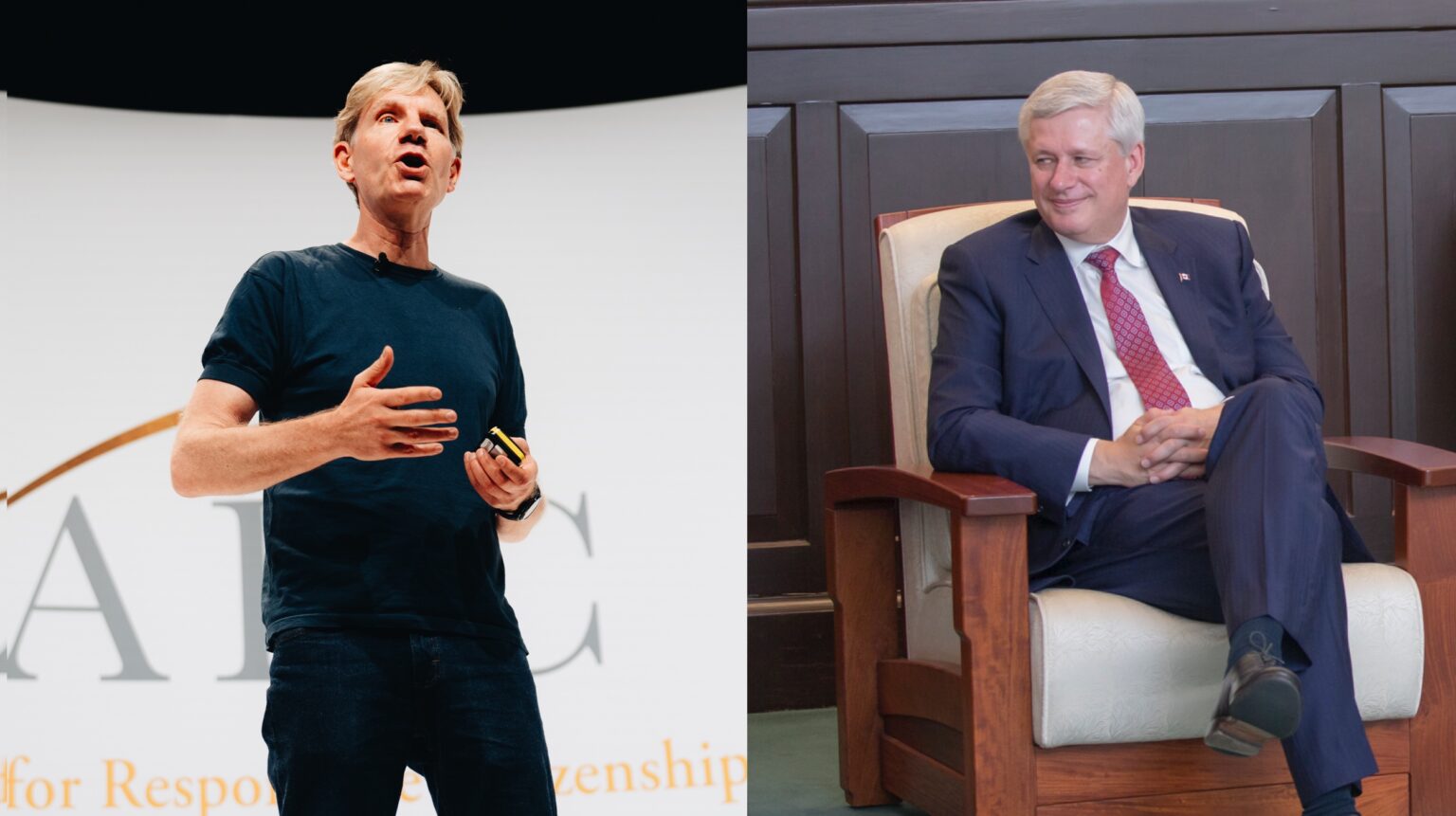Canadians wondering how seriously Pierre Poilievre’s Conservatives would deal with the climate emergency will find timely clues from the other side of the world. Climate crisis denier Bjorn Lomborg shared the stage with former Conservative Prime Minister Stephen Harper at the Raisina Dialogue 2025 in India where they both agreed that fossil fuels should not be displaced by renewable energy anytime soon. Lomborg assured the audience that “if you want more power, and most people do, because that’s the best way to get more economic development, you…need fossil fuels.”
Lomborg has had a lengthy career as climate contrarian, often acknowledging warming while undermining solutions. His dubious and discredited ideas continue to be hoisted high by various vested interests opposed to the accelerating energy transition.
The so-called “skeptical environmentalist” is currently being platformed in a 10-part series in the Financial Post republished by the Fraser Institute. Lomborg’s latest offerings include such fossil fuel friendly pieces like “Solar and wind power are expensive,” “Despite what activists say, the planet is not on fire” and “Climate change isn’t causing hunger.”
Meanwhile back in the real world, South Korea is experiencing their worst-ever wildfires that have killed at least 28 people. The United Nations just released a report documenting that 2024 was the hottest year on record with more than 150 “unprecedented” climate disasters displacing 800,000 people. The Potsdam Institute, a German climate research lab, recently published a peer-reviewed study showing the Earth could face civilization-ending temperatures of 7 degrees hotter by 2200.
Such inconvenient truths might not be an inconvenience to Lomborg, who has enjoyed annual salaries of up to $775,000 USD and is approaching comfortable retirement after years of well-compensated climate obfuscation.
Poilievre Connections
Stephen Harper remains tightly entwined with Conservative leader Poilievre, as recently documented in DeSmog. Harper is considered a mentor to Poilievre who was elected into Harper’s caucus at the age of 25 and was his political boss for his first decade in parliament.
The two still share multiple connections through political operatives like Hamish Marshall, who co-founded Rebel News in 2015, and lobby groups like Wellington Advocacy that represents fossil fuel companies Koch Industries, Suncor and Pembina Pipelines.
Harper’s consultancy company shares a staff member with Wellington Advocacy. A former Wellington staffer has connections with Mobilize Media, a conservative communications company Poilievre retained for his leadership campaign of the federal Conservatives.
Political operative Jeff Ballingall founded both Mobilize Media and Canada Proud, which is spending up to $200,000 on social media attack ads on Prime Minister Mark Carney. These include a particularly repellent insinuation that Carney was somehow involved with a “global child sex trafficking ring” with celebrity pedophile Jeffery Epstein.
Conservative Climate Record
Harper and Poilievre also share a consistent disdain for climate action. When Harper came to power in 2006, his government cancelled billions in previously committed government spending to fight climate change, and axed ongoing work within Environment Canada to regulate industrial emissions. Harper famously described the Kyoto accord as “a socialist scheme to suck money out of wealth-producing nations.” He withdrew Canada from the international climate agreement in 2011.
Poilievre voted against the environment and climate nearly 400 times over his 20-year career as a Canadian politician. His relentless focus against carbon pricing stands in stark contrast to his own vague climate policies that have been described by the former editor of Alberta Oil Magazine as a “joke.”
In the increasingly unlikely event that he becomes prime minister, Poilievre would likely eliminate the Oil Tanker Moratorium Act, emissions caps on oil sands producers, and electric vehicle mandates.
Seemingly disappointed that he can no longer campaign against the now-cancelled consumer carbon tax, Poilievre announced that he would instead remove industrial carbon pricing. This would put Canada at odds with our most important emerging trading partners, like the European Union, which plans to bring in a carbon border adjustment mechanism to ensure a level playing field around global trade and emissions accounting.
This is essentially a tariff on imports from countries that lack a credible carbon policy, making those goods less competitive. Not surprisingly, Canadian energy companies and financial institutions like RBC are generally in favour of predicable industrial carbon pricing that has been on the books for many years and often administered by the provinces. That Poilievre would announce an emissions policy beyond even what the oil industry is asking for is emblematic of what a disastrous leader he would be to deal with the climate crisis. It should not be surprising that Harper and Lomborg are cordially rubbing shoulders at an energy policy event, or that they share the pro-oil proclivities of Pierre Poilievre. All three emerged from the fossil fuel ecosystem that has promoted many political proxies trying to slow down the global energy transition. If Canadians needed one more reason not to vote for Pierre Poilievre, Bjorn Lomborg and Stephen Harper just provided a timely reminder.
Subscribe to our newsletter
Stay up to date with DeSmog news and alerts







